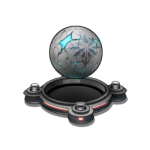Epiphyllum

Epiphyllum, commonly named Night-blooming cereus or Queen of the Night, is a plant genus native of Central and South America, peculiar for producing large flowers that only bloom at night.[1]
In the world of Girls' Frontline, Epiphylla flowers have the additional peculiarity of being able to absorb Collapse radiation for long periods of time before releasing it all at once when they bloom.[2] Epiphylla also bloom when the surrounding levels of Collapse radiation reaches a certain threshold.[3] While soil silication and Collapse storms make Red Zones and Yellow Zone borders hostile to plant life, regional variations of Epiphylla can grow in large clusters on low terrains.[4]
Applications[edit]
Rich collectors in White Zones will pay high sums to acquire Collapse Epiphylla, leading some bounty hunters to brave the Red Zones to acquire them.[5]
ELID inducer[edit]
90wish studied the application of Epiphyllum for Collapse radiation cleanup, then later as a means to induce controlled ELID that would allow human subjects to interact with Relic Technology. They ran over three million simulations on the potential of using the large doses of radiation released by blooming Epiphylla to modify the genetics of human subjects to the point where they would be registered as authorized users by Relics, but failed to find a method that would not trigger ELID disease in the subject. They were also unable to simulate subjects with higher resistance who could be infected and used to unlock low-authorization relics before dying, nor replicate the unique Collapse radiation immunity of Kawasaki Kazusa. Professor William believed only live tests could bear results, and since 90wish denied human experimentation, he cultivated improved Epiphyllum strains and used the Red Zone city of Tallinn for his own experiments. He used the failed Nyto clones (“Isomers”) and refugees who were lured in as live subjects,[2] using Paradeus units to prevent them from leaving the city.[6]
The vast field of Epiphyllum in the valley near Tallinn[7] bloomed at night every several days,[8] when Isomers would assemble to be “cleansed of their failed bodies, ascend to Heaven and find peace”, every time killing most Isomers. Isomer White was the only Isomer who was never killed by the blooming Epiphyllum.[9]
William later expanded his Epiphyllum operations by backing the plants-worshipping cult running the Flora Institute of Bremen in Germany. The cult cultivated William's enhanced Epiphyllum in the Institute's underground levels,[10] and the radiation-soaked flowers were then sent to other locations in Europe to create new ELID infected.[11]
Iaso's Box[edit]

An Iaso's Box is a pollen bomb[12] and the ultimate stage of Epiphyllum weaponization reached by Paradeus. It is named after the Ancient Greek goddess of recuperation from illness, one of the daughters of Asclepius, god of medicine. The dangerous box motif is borrowed from the Greek myth of Pandora's Box.
The Boxes were developed by Paradeus in cooperation with Leone Michel from the Flora Cultists, and resulted in a weapon of mass destruction that is both easy to carry[13] (Narciss carries one during the Berlin Prison attack[14]) and undetectable by conventional methods.[13] Containing irradiated Epiphyllum pollen at high concentration, an Iaso's Box can quickly infect a large area with ELID. Operation Cocoon, Paradeus' plan to destroy Berlin, involved the deployment of a large number of Boxes in the city.[15][16]
Collapse particle generator[edit]

Artificially grown Collapse Epiphyllums contained in portable individual units are used as Collapse particle storage in the Remolding Pattern technology that emerged in the 2070s. When the Remolding Pattern is activated, the Epiphyllum is made to bloom, and the Collapse particles it releases are harnessed to induce Reverse Collapse.[17]
Radiation detection[edit]
Artificial epiphyllum strains that do not emit collapse radiation but are extremely sensitive to it are used to measure the local concentration of radiation.[18] In the 2070s, the URNC's Contamination Zone Survey Maintenance and Environmental Analysis Group deployed drones equipped with Type d8W3 Epiphylla to investigate radiation levels.[19] Makeshift Ephihylla radiation detectors are also used in contamination zones. When they bloom, it means a Collapse storm is approaching.[3]
Radiation weapons[edit]
The Paradeus units Staff of Aesclepius and Dish of Aceso, aside from sharing the Greek medicinal pantheon motif in their name, can produce an Elusinian Mysteries cannon, powered by an Iaso's Box and able to fire an irradiated plasma beam contaminating the target area.
Trivia[edit]
- The Dorm Furnitures Elite Emblems - Phantasmal Floor and Elite Emblems - An Instant on a Silent Night are based on the Tallinn Epiphyllum field.
- Girl of the Bakehouse, the first project of MICA Team, was originally titled Epiphyllum. The final version of the visual novel makes no reference to the flower.
References[edit]
- ↑ Wikipedia - Epiphyllum
- ↑ 2.0 2.1 Girls' Frontline, Shattered Connexion, Fractured Cognition I
- ↑ 3.0 3.1 Girls' Frontline 2: Exilium, Dusty Journal#Shadow in the Snow 4
- ↑ Girls' Frontline 2: Exilium, Pre-release Lore, Red Zone & Yellow Zone
- ↑ Girls' Frontline 2: Exilium, Dusty Journal#Mysterious Message
- ↑ Girls' Frontline, Shattered Connexion, Fractured Cognition II
- ↑ Girls' Frontline, Shattered Connexion, All-Devouring Sea of Flowers
- ↑ Girls' Frontline, Shattered Connexion, Subsurface Homecoming II
- ↑ Girls' Frontline, Shattered Connexion, Isomer II
- ↑ Girls' Frontline, Dual Randomness, Gathering Frost Wolves
- ↑ Girls' Frontline, Dual Randomness, Hay Fever – Beginning
- ↑ Girls' Frontline, Mirror Stage, Clothos’ Thread II
- ↑ 13.0 13.1 Girls' Frontline, Mirror Stage, Heraclitus’ River I
- ↑ Girls' Frontline, Mirror Stage, Cretan Labyrinth II
- ↑ Girls' Frontline, Mirror Stage, Ariadne’s Clew III
- ↑ Girls' Frontline, Poincaré Recurrence, Decreasing Entropy V
- ↑ Girls' Frontline 2: Exilium, SL-4-2
- ↑ Girls' Frontline 2: Exilium, Classified Briefings#Unusual Snowfall Survey Report
- ↑ Girls' Frontline 2: Exilium, Classified Briefings#Sebeş-02B Work Journal
| Lore topics |
|---|

